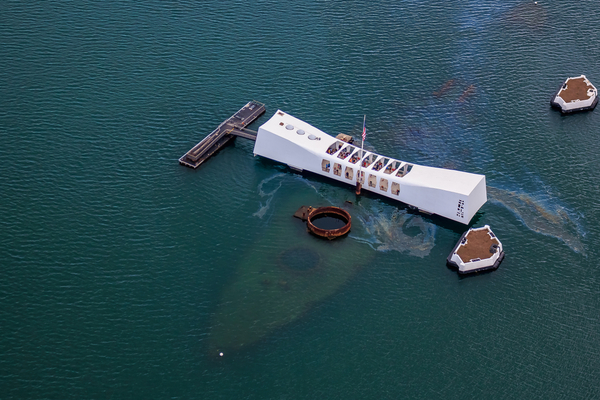Many of the heroes stationed at Pearl Harbor on December 7, 1941, 83 years ago, were boys at the time. Navy ship deck logs meticulously record the utter averageness with which their morning began: A log entry for the USS Cummings records that the ship received “15 gallons of milk, 7 gallons of ice cream,” and “300 pounds of ice.” The very next entry, however, is jarring:
“Air Raid. Japanese planes commenced torpedo attack on battleships in Pearl Harbor.”
Their morning began as any Sunday on Oahu might; it ended as “a date which will live in infamy,” a nightmare forever seared into the nation’s memory.
Imperial Japan’s “unprovoked and dastardly” raid killed 2,403 Americans, wounded 1,000 more, and decimated our Pacific Fleet, leaving a score of ships and hundreds of aircraft damaged or destroyed. But more than that, it triggered America’s entry into World War II — as Japanese Admiral Isoroku Yamamoto reportedly confessed (words that first appeared in the 1970 film, “Tora! Tora! Tora!”), “I fear all we have done is to awaken a sleeping giant and fill him with a terrible resolve.”
Such resolve indeed swept the nation, which vowed never to forget the horrors of that dreadful day. Millions of Americans joined the war effort, and “Remember Dec. 7th” became a popular wartime recruitment slogan.
The true meaning of that day will never be lost on those who lived through it. Yet, with each passing year, the memory begins to fade. As the number of survivors dwindles, we lose not just voices but irreplaceable fragments of the story — pieces that can never be recaptured.
Last year, Joseph Eskenazi, once the oldest living survivor, passed away shortly after celebrating his 105th birthday. Ken Potts, one of the final two USS Arizona survivors, also died in 2023, leaving only his friend, Lou Center, 101, who passed away this year. Last year, only six survivors participated in the commemoration ceremony at Pearl Harbor; as recently as 2019, “dozens” were in attendance.
In a world deluged with fame-seeking and self-congratulation, these men were often surprisingly reticent about their wartime service. In fact, whenever Eskenazi was called a hero, he disagreed that he was, from his perspective, only a “survivor.” However, as the sights, sounds, images, and emotions of that infamous day increasingly fade from the nation’s memory, they seem to express a newfound openness to reliving the past, if only to preserve it for posterity.
“He loves... to do short interviews with the younger generation to keep the history, especially World War II, ongoing because he is the last generation, and it’s dwindling quickly,” Lou Center’s daughter said.
Another survivor, Ike Schab, 104, also once spoke sparingly about the bombing but has since become more communicative. When asked why, he replied, “Oh, because I think I owe it to the guys who were there who aren’t there anymore. Don't forget it. Don’t forget it. Just keep it alive.”
As the Greatest Generation fades, the task of preserving the memory of Pearl Harbor falls to us. Now, more than ever, we must not forget the legacy of those who survived or the sacrifice of those who did not. Heroes like Joseph Eskenazi, Ken Potts, Lou Center, Ike Schab, and hundreds of others have secured for us a beautiful tapestry of American fortitude, courage, and patriotism — virtues we must reclaim and embody if we hope to pass that tapestry on to the next generation.
Should the American experiment in liberty last for a thousand years, may men still look back and remember that those heroes — those everyday heroes and boys who received ice cream on an early morning in December — were among the finest we ever produced.
May “Remember Dec. 7th” ring true for the ages.
Now, more than ever, we must not forget
Published in Blog on December 06, 2024 by Jakob Fay






